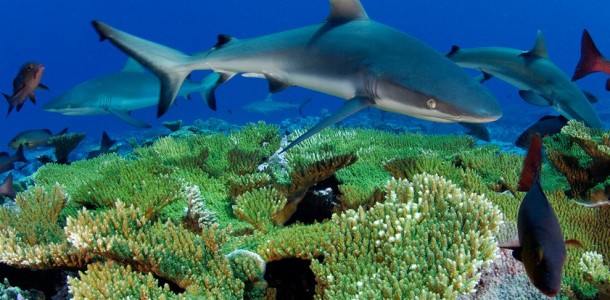Here is an interesting article about some new safeguards in place to protect five species of sharks and two types of manta rays - the first time that trade limits have been placed on the shark species in nearly a decade.

Shark, rays win new trade protections
By Juliet Eilperin, Published: March 11
Five species of sharks and two types of manta rays won new safeguards Monday, as delegates to a global wildlife summit voted to limit the trade of species that have been overharvested for decades.
Historically, many nations have been reluctant to protect marine species that are in high demand for health remedies and culinary delicacies, primarily in Asia. But faced with scientific evidence that these species risk becoming extinct, the Convention on International Trade in Endangered Species of Wild Fauna and Flora (CITES) voted in Bangkok to place trade limits on shark species for the first time in nearly a decade.
Sonja Fordham, president of Shark Advocates International, said she was “delighted” that countries will now have to prove that any catch of porbeagle, oceanic whitetip and three species of hammerhead sharks is sustainable and legal before allowing for export. In 2010, delegates rejected attempts to protect the five shark species, including scalloped, great and smooth hammerheads.
“These highly traded, threatened shark species urgently need protection from the unsustainable trade that jeopardizes populations, ecosystems, livelihoods and ecotourism,” Fordham said.
Less than two weeks ago, scientists published findings showing that commercial fishing kills 100 million sharks a year; they are targeted for their fins and caught accidentally. Before this vote, only three species of sharks — great white, basking and whale — were protected under CITES.
Sharks and manta rays are vulnerable because they take years to mature and they produce offspring infrequently. Mantas, for example, have a single baby every two to three years, and are easy to catch because they move in large groups.
The United States joined Brazil and Colombia in pushing for trade limits on oceanic whitetip sharks, which were once one of the most abundant large animals on Earth but whose population has nose-dived 99 percent in the Gulf of Mexico and the Mediterranean.
Although vessels catch sharks worldwide, India and Sri Lanka host the biggest manta ray fisheries. Fishermen there sell the animals’ gill plates to produce a health tonic in Asia.
Elizabeth Wilson, who manages the Pew Environment Group’s global shark campaign, said the broad array of countries backing the proposals this year helped produce success this time around. The coalition included not only the United States and the European Union, but also smaller countries such as Honduras, Mexico and Egypt.
“It really made them hard to oppose,” Wilson said.
Any proposal to restrict trade of a species requires a two-thirds majority vote; although any country can call for a re-vote in the conference’s final session at the end of the week, U.S. officials and other experts said that was unlikely.
“Populations of these species are in severe decline, primarily due to commercial exploitation,” Bryan Arroyo, head of the U.S. delegation to the conference, said in a statement. He said the decisions were supported by science and that he was confident that the conference would uphold them.
Delegates also voted to ban all trade of the freshwater sawfish, a type of ray with a long, toothy snout that is targeted for its fins. When CITES prohibited the trade of all other sawfish in 2007, it made an exemption for freshwater sawfish so Australia could continue to sell to American aquarium collectors.
Fordham said the move “will complete a global ban in international commercial sawfish trade, and thereby bolster existing protection for all sawfish species.”